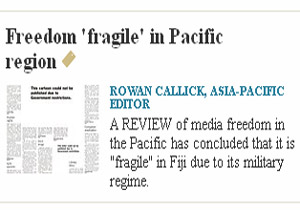
MELBOURNE (The Australian / Pacific Media Watch): A review of media freedom in the Pacific has concluded that it is "fragile" in Fiji due to its military regime, and in Vanuatu "where blatant intimidation has continued with near impunity".
Violence has also been directed at the media in the Indonesian provinces of Papua and West Papua, it says.
The annual report was published by the Pacific Journalism Review, which is produced by the Pacific Media Centre at New Zealand's Auckland University of Technology.
Authors Alex Perrottet and David Robie say: "Coupled with governments that are sluggish to introduce Freedom of Information legislation and ensure region-wide constitutional rights to free speech are protected, there are limited media councils and advocacy bodies with few resources to effectively lobby their governments.
Government control
"Those that do run the risk of inviting backlashes by government figures who have a poor appreciation of the role of independent media in national development."
Media remain under the thumb of governments in smaller countries, the authors say, and are mainly used as instruments for uncritically disseminating official information.
Fiji is highlighted as the most serious cause for concern because of the degree of military control, with government censors, including army officers, stationed in media offices and with the draconian Media Decree of June 2010, allegedly introduced only as an emergency measure, rolled over monthly ever since.
The decree forced the sale by News Limited (owner of The Australian) of the Fiji Times, founded in 1869, because it was a foreign company.
The Fiji Times, which had been a thorn in the flesh of the army regime, was bought by local businessman Mahendra Moribhai Patel, who was jailed for corruption in April.
Stanley Simpson, the former news director of the government-owned Fiji Broadcasting Commission, said: "Journalists today are not as confident as their counterparts were prior to 2006 (when the military staged a coup).
"It is a courageous thing to be a journalist at this time. However, we are constantly asking ourselves if the stories we write will breach the Public Emergency Regulations, and what the consequences might be.
"This is the longest period of censorship and public emergency regulations the country has experienced. How Fiji media and journalists survive and adapt to the current environment is critical," Mr Simpson said.
The review says that the Times' rival, the Fiji Sun, "has benefited from a state monopoly on advertising, but still faces censors in the newsroom every night. The editor, Leone Cabenatabua, has explained that his newspaper is 'co-operating'.
"And the Weekend Sun editor Maika Bolatiki has said he supports the Media Decree, and that it is necessary to write only positive stories to move the country forward."
Vanuatu Daily Post publisher Marc Neil-Jones was opposed by Vanuatu Times principals when he applied for a radio licence as imposing a "Westerner's" influence on the airwaves there, even though he has lived in Vanuatu for 17 years.
Assault in Vanuatu
The review says: "Vanuatu provides an example of an intense media climate without any official censorship as in Fiji.
"Neil-Jones was assaulted in his own office earlier this year by a group of men at the behest of a government minister" in the latest of "a saga of violent reactions to his publication's reports".
The review notes the closure in September of the New Zealand Press Association, employing 40 journalists, after 130 years, "triggered by major shareholder Fairfax NZ, which had given notice that it planned to withdraw from the news co-operative".
The New Korea Herald was forced to close after the High Court awarded $NZ250,000 damages against it for defaming a prominent Korean businessman.
The review says Indonesia's provinces of Papua and West Papua are "subject to onerous restrictions on press freedom".
This article has been republished with the permission of the author.
(cc) Creative Commons
Paywall link to the report in The Australian's Media section



